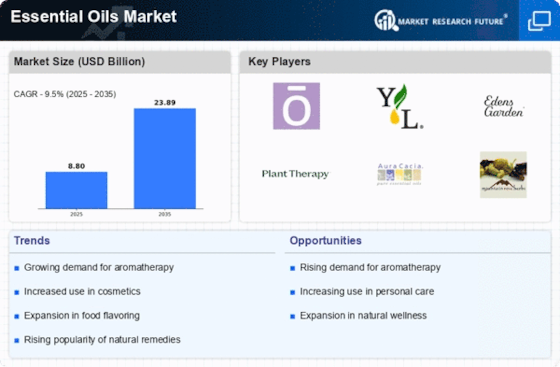Top Industry Leaders in the Essential Oils Market

The essential oils market has witnessed a dynamic competitive landscape, characterized by the presence of numerous key players striving to establish their market dominance. The market is highly fragmented, with players adopting various strategies to gain a competitive edge.
Key players in the essential oils market include
- G Baldwin & Co doTerra
- Rocky Mountains Oil
- Young Living Essential Oils
- Mountain Rose Herbs
- Ryohin Keikaku Co. Ltd
These industry leaders have been implementing strategies such as product innovation, mergers and acquisitions, and geographical expansion to solidify their positions in the market.
Strategies Adopted:
One prevalent strategy among key players is the focus on product innovation. Companies are consistently introducing new and diverse essential oil offerings to cater to the evolving consumer preferences and demands. The introduction of unique blends, organic and sustainable products, and personalized aromatherapy solutions has been a notable trend. This strategy not only enhances the product portfolio but also helps in attracting a broader customer base.
Mergers and acquisitions have been instrumental in shaping the competitive landscape of the essential oils market. Strategic collaborations allow companies to access new markets, expand their distribution networks, and capitalize on synergies. For instance, doTERRA International has pursued acquisitions to diversify its product range and consolidate its market position. Such moves enable companies to achieve economies of scale and improve overall competitiveness.
Geographical expansion is another strategy adopted by key players in the essential oils market. By establishing a strong presence in different regions, companies aim to tap into local markets and benefit from the growing demand for natural and organic products. Young Living Essential Oils, with its global distribution network, is an example of a company that has successfully expanded its footprint in various international markets.
Market Share Analysis Factors:
Factors for market share analysis in the essential oils market are multifaceted. Key determinants include product quality, brand reputation, pricing strategies, and distribution channels. With consumers becoming increasingly discerning about the quality and origin of essential oils, companies that prioritize transparency in their sourcing and production processes tend to garner higher market shares. Additionally, effective marketing and branding initiatives play a pivotal role in shaping consumer perceptions and influencing purchasing decisions.
As the essential oils market continues to evolve, new and emerging companies are entering the fray, intensifying competition. These companies often bring innovative products and disruptive business models, challenging established players. Some noteworthy emerging companies in the essential oils market include Plant Therapy, Edens Garden, and Mountain Rose Herbs. These entrants focus on organic and sustainable practices, catering to the rising consumer awareness regarding environmental and ethical considerations.
Industry Trends:
Industry news and current company investment trends reflect the dynamic nature of the essential oils market. Companies are increasingly investing in research and development to discover new botanical sources, extraction methods, and applications for essential oils. Moreover, investments in sustainable and eco-friendly practices are gaining prominence, aligning with the growing global emphasis on environmental conservation.
Competitive Scenario:
The overall competitive scenario in the essential oils market is characterized by a delicate balance between established players and newcomers. While key players leverage their brand equity and resources to maintain market dominance, emerging companies disrupt the status quo by introducing novel approaches and products. The market's dynamism is further fueled by changing consumer preferences and the continuous quest for natural and holistic well-being solutions.
Recent Development
In terms of recent developments in 2023, the essential oils market witnessed several notable events. Industry leaders embraced digitalization and e-commerce platforms to enhance their reach and accessibility. The COVID-19 pandemic accelerated the shift towards online sales channels, prompting companies to invest in robust online infrastructure and marketing strategies. Additionally, there was an increased emphasis on traceability and sustainability, with companies investing in supply chain transparency and eco-friendly practices.











